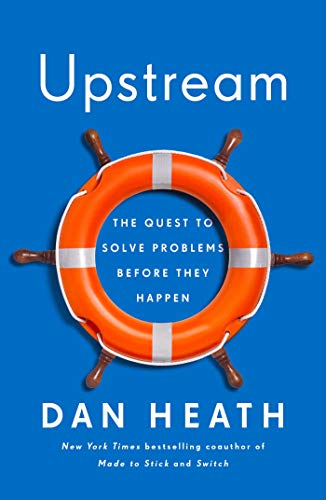Upstream: The Quest to Solve Problems Before They Happen by Dan Heath Link to heading
Summary Link to heading
“Upstream: The Quest to Solve Problems Before They Happen” by Dan Heath explores the concept of upstream thinking—a proactive approach aimed at addressing and preventing problems before they arise rather than reacting to them after they occur. The book is structured around a series of real-world examples and stories that illustrate how individuals and organizations can pivot their focus towards preemptive strategies. Heath outlines how systemic barriers and psychological tendencies often prevent upstream thinking and presents strategies to overcome these challenges.
Review Link to heading
Dan Heath’s “Upstream” is a compelling and thought-provoking read that challenges conventional problem-solving methodologies by advocating for preventative strategies. The strength of the book lies in its accessible presentation of complex ideas through engaging anecdotes, making it relevant to both lay readers and professionals. However, some critiques suggest that while the book provides strong theoretical frameworks, it occasionally lacks detailed guidance for practical implementation across diverse contexts.
Key Takeaways Link to heading
- Shift in Mindset: Transition from reactive to proactive strategies by identifying potential future problems.
- Intervention Leverage: Small, strategic interventions can have significant impacts if applied correctly at critical juncture points.
- Systems Thinking: Understand that problems often arise from systemic issues that require holistic solutions.
- Addressing Barriers: Recognize and address psychological and organizational barriers that impede upstream efforts.
- Collaboration and Coordination: Multi-disciplinary collaboration and coordination across sectors is crucial for upstream success.
Recommendation Link to heading
“Upstream” is highly recommended for business leaders, policymakers, social workers, educators, and anyone interested in innovative problem-solving methods. It provides valuable insights into how strategic foresight and preemptive action can lead to more efficient and effective solutions across various domains. The book is especially beneficial for those seeking to enhance their strategic planning and leadership skills by adopting a prevention-focused perspective.
